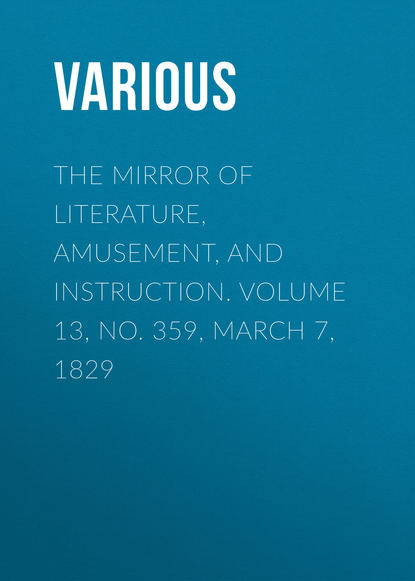По всем вопросам обращайтесь на: info@litportal.ru
(©) 2003-2024.
✖
The Mirror of Literature, Amusement, and Instruction. Volume 13, No. 359, March 7, 1829
Автор
Год написания книги
2018
Настройки чтения
Размер шрифта
Высота строк
Поля
Dougal, a Dane.
Mac Intosh, son of the chief.
Mac Tagart, son of the priest.
Mac'Nab, son of the abbot.
Mac Clery, son of a clerk.
Mac Lure, son of a tailor.
Macgill, son of a squire.
Macbrehane, son of a judge.
Mac Tavish, son of a savage.
Goff, or Gough, smith.
Galt, a Protestant.
Gillespie, the bishop's squire.
The whole of the above are literal translations without having recourse to fancy, or torturing the originals; thus, Macnamara, called in Irish Mac Conmara, from mac, a son, con, the genitive case of cu, a hound, and mara, the genitive case of muir, the sea; and so of the rest. It is proper, however, to observe, that although the name of Keating sounds exactly in Irish a "shower of fire" yet as the Keatings came at first from England, this cannot be the real origin of that name. All the rest are literally correct.
H.S.
ONIONS
Lord Bacon tells us of a man who fasted five days, without meat, bread, or drink, by smelling a wisp of herbs, among which were strong onions.
notes
1
Their annual meeting is in August, when the examination takes place. Fourteen exhibitions have been instituted, each of the exhibitioners being allowed forty pounds per annum to assist in their support, for seven years, at either university.
2
See Ode to London Stone. MIRROR, No. 357, p. 114.
3
See Shakspeare's Henry VI., part 2, act 4, scene 6.
4
The ancient name for London.
5
The cause of the great plague in 1665, was ascribed to the importation of infected goods from Holland, where the plague had committed great ravages the preceding year.
6
Stowe in his history describes the London Stone, "fixed in the ground very deep, fastened with bars of iron and otherwise, so strongly set that if carts do runne against it through negligence, the wheels be broken, and the stone itself unshaken."
See No. 64 of the Mirror for an account of London Stone.
7
When the church of St. Swithin was repaired in 1798, some of the parishioners declared the London Stone a nuisance which ought to be removed. Fortunately, one gentleman, Thomas Maiden, of Sherborne Laue, interfered and rescued it from annihilation, and caused it to be placed in its present situation.
8
From sources entirely original.
Mac Intosh, son of the chief.
Mac Tagart, son of the priest.
Mac'Nab, son of the abbot.
Mac Clery, son of a clerk.
Mac Lure, son of a tailor.
Macgill, son of a squire.
Macbrehane, son of a judge.
Mac Tavish, son of a savage.
Goff, or Gough, smith.
Galt, a Protestant.
Gillespie, the bishop's squire.
The whole of the above are literal translations without having recourse to fancy, or torturing the originals; thus, Macnamara, called in Irish Mac Conmara, from mac, a son, con, the genitive case of cu, a hound, and mara, the genitive case of muir, the sea; and so of the rest. It is proper, however, to observe, that although the name of Keating sounds exactly in Irish a "shower of fire" yet as the Keatings came at first from England, this cannot be the real origin of that name. All the rest are literally correct.
H.S.
ONIONS
Lord Bacon tells us of a man who fasted five days, without meat, bread, or drink, by smelling a wisp of herbs, among which were strong onions.
notes
1
Their annual meeting is in August, when the examination takes place. Fourteen exhibitions have been instituted, each of the exhibitioners being allowed forty pounds per annum to assist in their support, for seven years, at either university.
2
See Ode to London Stone. MIRROR, No. 357, p. 114.
3
See Shakspeare's Henry VI., part 2, act 4, scene 6.
4
The ancient name for London.
5
The cause of the great plague in 1665, was ascribed to the importation of infected goods from Holland, where the plague had committed great ravages the preceding year.
6
Stowe in his history describes the London Stone, "fixed in the ground very deep, fastened with bars of iron and otherwise, so strongly set that if carts do runne against it through negligence, the wheels be broken, and the stone itself unshaken."
See No. 64 of the Mirror for an account of London Stone.
7
When the church of St. Swithin was repaired in 1798, some of the parishioners declared the London Stone a nuisance which ought to be removed. Fortunately, one gentleman, Thomas Maiden, of Sherborne Laue, interfered and rescued it from annihilation, and caused it to be placed in its present situation.
8
From sources entirely original.











